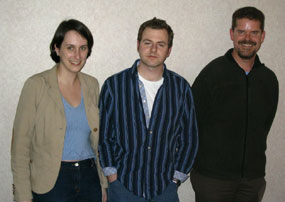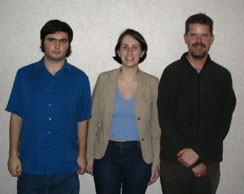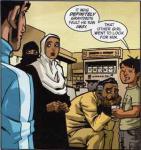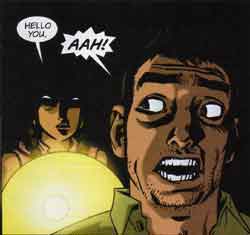Sex, Lies, and Online Comics Writing
I can’t stay gone because I can’t stand to stay silent right now. Manga Life is a site from the folks who brought you Silver Bullet Comics: “Our aim is to guide you through the masses of manga appearing on the shelves of your book store, to pick out THE essential books to own.” While it was Johanna Draper Carlson who brought this to my attention, their review of From Eroica with Love deserves a close read. I realize that comics journalism on the internet is pretty dire and assume that there is little editorial oversight anywhere, but apparently the SBC/ML crew are okay with statements like “[homosexuality] is a gender, not a ‘Lifestyle choice’” and “[the male characters] look like women in drag! ” (since I’m assuming the author, Michael Deeley, doesn’t mean they do, in fact, resemble women in drag, who could pass as men) being prominently displayed in their reviews. I mention this because his input alone is enough to make me want to avoid the site. But I’m not just offended by the total lack of empathy or tact (”Also, the gay love scenes made me cringe. I????????m open-minded; not open-bodied.”) but by the fact that this is just horribly written. I don’t want to hear from an editor about how they’ll do better in the future; the present matters and it’s awfully grim.
Enough. I just wanted to pause a moment and go back to that (sort of) to boil things down to the most generic level and say that, basically, people have sexes (biological/genetic), genders (cultural expressions of masculinity/femininity), and sexual orientations (straight/gay/bisexual) with several other options that could be tossed into each of my parentheticals. Anyone who can’t handle this level of terminology probably shouldn’t be talking about any of this.
And have you guessed yet where I’m going with this? Maybe, if you saw that I already sputtered about this this morning, but here I go again. I’m a big proponent of conversation, communication, mutual understanding, which I hope would be clear to anyone who’s been reading this blog for any length of time. I think that at some fundamental level we do end up with Roman Jakobsen/James Smith-style mutual untranslatability where each of us uses language in a unique enough way that to some extent we can’t fully speak to one another. And so if I were James Meeley, I would never have assumed that “explor[ing] the kids’ identities — sexual and otherwise –” meant to everyone what it means to me. In fact, I know it doesn’t, since to me exploring a sexual identity means trying to figure out what sort of people you find attractive, dealing with fluttery yearnings and awkward kisses and awkward suitors and unrequited affection. And sure, at some point, sexual activity probably comes into the picture, but it’s by no means the core. And so my first objection to Meeley’s first objection to the aforementioned trend in Young Avengers is that the simplest response would be to clarify the terms, not draw up battle lines. But that’s why I’m not the sort of person who sends offended letters to comics publishers, I suppose.
My second and more important objection to both that and his second objection is that if he wants to convince everyone there’s no homophobia here, I’d like to see a little logic. Meeley’s complaint is about alleged future sexual content in an “all-ages” title. I see no point in disputing about what the future may hold, but you just can’t argue that this is an all-ages title. It’s quite clearly labeled PSR, which as a retailer of sorts is something he should understand means this is material suitable for 12-year-olds and older readers. While this is what Marvel used to call PG back when they were stealing terms from the MPAA, but clearly it’s more equivalent to their PG-13 rating. And what does PG-13 mean? It means that parents are strongly cautioned that some material may be inappropriate for kids under the age of 13. Marvel’s PSR is appropriate for most ages but parents should review it before or with young (presumably sub-12) children. Whether or not Meeley thinks this should be an all-ages book has no bearing on its status in reality. (Both Marvel and the MPAA share what I consider a disturbing tendency to let kids see tons and tons of violence per rating level, but that doesn’t really factor into this argument, thank goodness.)
My brother is 13 and I’d have no qualms about letting him read Young Avengers. I differ from James Meeley in that I would still lend him my copy if there was some gay romance, although I’m still not sure what this “sexual exploration” that so frightens him entails. And I suppose I’d let him watch PG-13 movies and have in fact taken him to a few myself. One I haven’t taken him to see but enjoy a lot myself is Saved, which I think could teach us a thing or two about the PG-13 rating (and, by extension, what sort of material is appropriate for the 12-and-up crew who are the explicit target audience for Young Avengers). In Saved, Mary is a student at a Christian high school whose classmate and boyfriend confesses to her that he thinks he’s gay. She decides to have sex with him (on screen, though with tasteful editing) to try to encourage a conversion experience that will make him straight. The experiment is a failure: he gets sent to a “recovery” program and she ends up pregnant. The rest of the film deals with these high school students (I don’t think I’m old enough yet to call them “kids”) exploring their identities — “sexual and otherwise.” This means everything from Mary’s sex with Dean to her later shy flirting with new student Patrick to her super-Christian friend Hillary Faye’s ends-justify-the-means attempt to draw attention to a topic she cares about to Cassandra’s ups and downs as a Jew at a Christian school and her boyfriend Roland’s experiences as a paraplegic. Because it’s a PG-13 movie set in a Christian high school, there’s not a lot of profanity, though Mary says “fuck!” after finding out she’s pregnant. In PG-13 movies, apparently, you can get away with one non-verbal “fuck” that doesn’t refer to a sex act. I’m pretty sure that’s not true even of PSR+ books at Marvel. Would I have taken my brother to see it? Probably not, because he’s young for his age and still sort of disgusted by kissing and also because my parents’ views and mine differ on religion and I wouldn’t necessarily want to get into that with him or upset them just because of a movie. But I’ve lent it to the brothers older than him and wouldn’t mind at all if he wanted to borrow it in a year or two when he’s ready for that sort of story.
Where am I going with this? Nowhere, really, because Meeley’s response when David Welsh posed the question of ratings to him this morning was just to say that Young Avengers ought to be all-ages. It’s not entirely clear whether this is a “some imaginary world, like, in my head” kind of response or that he simply wishes there were more all-ages comics or that he’s seen the recent darkening of the Marvel and DC universes and plans to rage against the dying of the light. The facts are that Young Avengers isn’t an all-ages title and doesn’t have any homosexual content. I don’t see why there’s any reason for it to be a last stand in the culture wars. By all means, it’s fine to write to Marvel to ask them to bring back Bucky or keep queers out of the limelight or aim for a no-prize in explaining what’s really up with The Scarlet Witch, but I hope no one doing this would be surprised when the response isn’t total concession from the publisher. Maybe as a woman and a feminist and someone well outside the target audience I’m just used to the idea that my preferences won’t be heard or reflected in most superhero comics, but I would hope that’s a more universal response.
And as usual, I don’t like the idea that comics need to be for kids. I wish there were more comics for smart people of many different ages, and it’s that lack that I’m feeling most acutely now. Young Avengers could perhaps be just such a title, a book young teens could read about the perils and excitement of being a teen writ large. I doubt it will be, but unlike some people I’m willing to hope. And I’m willing to say my piece and go away from things that don’t appeal to me, so this should be the last you hear from me about Manga Life unless things change drastically. But I think it’s worth having a conversation rather than sermonizing, don’t you?



